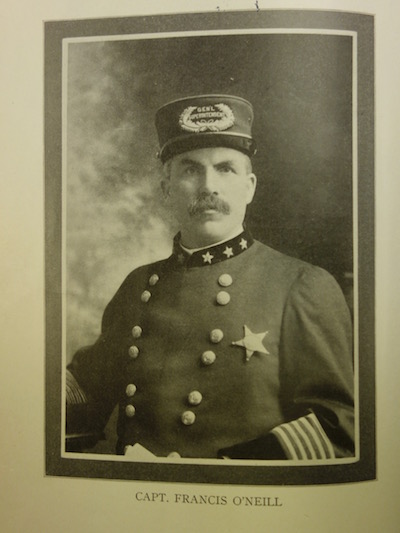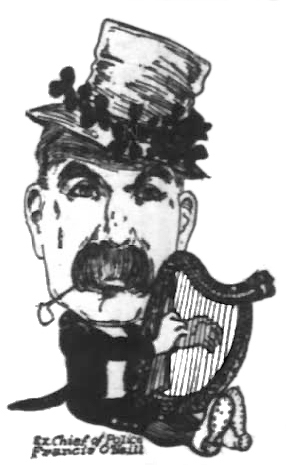Francis O'Neill
collector, biographer, administrator, musician; private recordings exist
b. Tralibane, County Cork, Ireland Aug. 28, 1848
d. Chicago, Illinois Jan. 28, 1936

The frontispiece, O'Neill, Francis Irish Minstrels and Musicians Chicago 1913

From the article "Donnybrook Fair Was Nothing Like This" Chicago Sunday Tribune Aug. 15, 1909 p. 3 column 1
Newspapers.com
Thanks to Tom Klein for clarifying this image.
Anyone who studies the lives of old Irish pipers quickly encounters the work of Francis O'Neill. His work is monumental, inescapable. His writing seemed the only source of information about many pipers. In the late 1980s, when I became first interested in piping history, an attitude was not uncommon: if it was not mentioned by O'Neill it did not happen, or was not worth examining. One encounters this attitude less and less as the years go by.
Still, O'Neill compiled a remarkable amount of information about players of Irish pipes, and no less remarkably, had the will and generosity to publish it at great personal expense. He is often the best, if not the only, source for personal information on many players. O'Neill's work was diligent and careful. He may have recorded some misinformation, but not much, and his accounts and opinions are not to be easily disregarded.
In his personal manner O'Neill is said to have been modest, "Never obtrusive in his own opinions ... courteous and obliging." In his writing he comes across as completely confident in his judgments and assessments, which sometimes can be harsh, sometimes tolerant. This confidence, even certainty, seems a product of the Victorian era. At the same time he did his best to be "objective," I think, and not let rancor or revenge color his public writings. His private writings were another story. A good example of this are the ways in which he writes about piper Barney Delaney.
Much has been written about O'Neill's life, including his own memoir, Chief O'Neill's Sketchy Recollections of an Eventful Life in Chicago and the superb biography by Nicholas Carolan, A Harvest Saved. Michael O'Malley's The Beat Cop is a wide-ranging effort to understand the man as policeman and music collector. What follows is a brief sketch of his life.
Daniel Francis O'Neill was born in west County Cork, his father a "well-to-do" farmer. He was the youngest of seven children and left home at age sixteen. Carolan describes him in youth as "both physically daring and studious." He sailed around the world and had remarkable adventures, held various jobs. He made his last working sea voyage about 1868 and settled in the United States. In 1870 he moved to Chicago and joined the police force there in 1873. He rose through the ranks and was chief of police 1901-05. O'Neill had a reputation as an honest and fearless policeman and administrator, an unusual characterization in that turbulent time and place. He retired from the police force in 1905. The rest of his life he was busy with family life, writing, research, musical activities. In addition to his house in Chicago he owned a farm in Palos, Illinois and a winter home on the Gulf Coast at Ocean Springs, Mississippi.
O'Neill married Anna Rogers in 1870. The O'Neill's had ten children. Six of them died young, three of them of diphtheria on the same day. The stress and sadness of these losses changed his life. "In deference to his wife's feelings he no longer played music in the house after 1904" after the death of his only remaining son Rogers O'Neill.
O'Neill described himself as "music mad" since childhood. Flute was his main instrument but at times in his life played fiddle, Scottish pipes and Irish or uilleann pipes. In later years he seemed to have principally played the whistle. He viewed Irish music as a crowning example of Irish culture, a source of great national pride. O'Neill focused on instrumental dance music. He came to associate with a group of like-minded musicians in the immigrant Irish community in Chicago. Some of these were marvelous players. As he rose in rank in the police department he supported, if he was not entirely responsible for, the hiring of several musicians to the force.
He had, or was presumed to have, a remarkable memory for tunes. He sought them out whenever opportunity arose, and his police work was useful in this respect; even walking the beat he might hear a tune coming out of a window and follow up. O'Neill began to collect tunes in manuscript and in the early 1880s enlisted violinist James O'Neill (no relation) to help him with transcription and editing. By 1902 they had more than 2,000 tunes in seven manuscript volumes "and a general desire developed to have them printed." In 1903 was published O'Neill's Music of Ireland: Eighteen Hundred and Fifty Melodies, the monster, unprecedented and still influential tune collection. Other collections of music followed. It is for these collections of music that he is best remembered.
O'Neil was a prolific writer with his own interesting style and with what might today be called a "unique voice." He began to write articles about traditional music and musicians, which became the book Irish Folk Music: A Fascinating Hobby, published in 1910. An intended revision of this book became the indispensable Irish Minstrels and Musicians, 1913, which, as Carolan says, "is essentially a biographical compendium...." Here is much of the information he published about Irish pipers. Throughout his life O'Neill had a particular affinity for the instrument and its players, and in IMM seems to devote an unusual amount of attention to them.
In 1917 O'Neill compiled a two-part list of "living performers on the union pipes," now at the National Library of Ireland.
In later years O'Neill was acknowledged one of the world's experts on Irish music. He amassed a large collection of books about Ireland and Irish music, perhaps 1,500 volumes. These were bequeathed to the library at the University of Notre Dame, Notre Dame, Indiana. Some manuscripts and letters survive in scattered locations, but one has the sense that quantities of material were not saved or were inadvertently destroyed.
In the 1930s he was troubled by deafness and deteriorating eyesight. Most of the musicians he had worked with in his collecting days had passed on. He was not optimistic about the future of the music he loved so much. Still, he maintained interest in musical activities and wrote and published articles about Irish music as late as 1934.
His wife Anna died in 1934. O'Neill died of heart failure at his home in Chicago Jan. 28, 1936, 87 years old. He was buried at Mount Olivet Cemetery, Chicago, in the family mausoleum.
Selected References
- Representative recording:
"The Boys of Bluehill" Edward Cronin, violin; Tom Kiley, mandolin; Francis O'Neill, tin whistle. "The voice is almost certainly O'Neill's." From the website associated with Michael O'Malley's book The Beat Cop. Recordings from Na Píobairí Uilleann, Dublin. accessed June 2022
https://thebeatcop.com/page/media/the-boys-of-bluehill
Carolan, Nicholas A Harvest Saved: Francis O'Neill and Irish Music in Chicago Ossian Publications, Cork Ireland 1997
Carolan, Nicholas "O'Neill, [Daniel] Francis" Encyclopaedia of Music in Ireland University College of Dublin Press 2013 vol. 2 pp. 784-5
Doherty, Liz "O'Neill, (Captain) Francis" The Companion to Irish Traditional Music Cork University Press, 2nd ed., 2011, pp. 524-6
"Gallery of Local Celebrities No. LXXXI.-Francis O'Neill." [an excellent biographical sketch; the brusque Chief of Police, the contemplative Irish scholar] Chicago Daily Tribune Aug. 25, 1901 p. 38
Proquest Historical Newspapers
Lindberg, Richard To Serve and Collect: Chicago Politics and Police Corruption from the Lager Beer Riot to the Summerdale Scandal Southern Illinois University Press 1998 pp. 53, etc.
O'Malley, Michael The Beat Cop: Chicago's Chief O'Neill and the Creation of Irish Music University of Chicago Press 2022
O'Neill, Francis; edited by Ellen Skerrett and Mary Lesch Chief O'Neill's Sketchy Recollections of an Eventful Life in Chicago Northwestern University Press 2008
O'Neill, Francis Irish Minstrels and Musicians Chicago 1913
O'Neill, Francis Irish Folk Music: A Fascinating Hobby Chicago 1910
O'Neill, Francis "Names and addresses of living performers on the union pipes sent by Francis O'Neill in Chicago to Seamus Ó Casaide in Dublin, letters of June-August 1917." From the National Library of Ireland, Seamus Ó Casaide Collection, Ms. 8116. Transcribed by Michael Kelly.
Nick Whitmer
August 2018 additions June, Oct. 2022